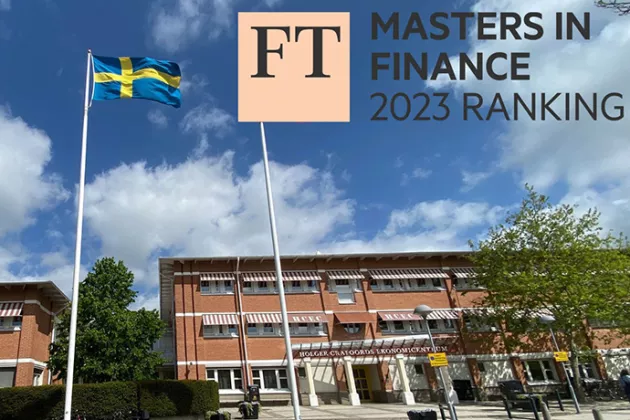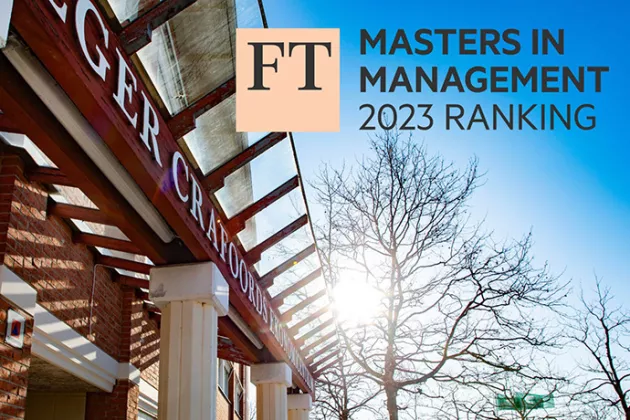Today (12 June 2023) the results of the latest FT Masters in Finance ranking are official and LUSEM has climbed 3 steps from #39 (2022) to #36. This year’s ranking involves the top 55 Masters in Finance pre-experience programmes in the world.
Several success factors
Programme director and Associate professor Jens Forssbaeck is of course happy about the climb and says that since the ranking is based in large part on the career outcomes of former graduates, it’s a clear thumbs up for the relevance and competitiveness of the program in the financial sector job market.
"We also know from experience that the ranking contributes to attracting very talented students to the programme, who then go on to have very successful professional careers. In addition, the ranking solidifies the good reputation of the programme among prospective employers and facilitates collaboration both with the corporate sector and with international academic partners. All of this contributes to the attractiveness of the programme among the best students, so the ranking is one component in a virtuous interplay between several success factors," Jens explains.
But this doesn't mean that Jens and others involved in the programme now lean back:
"Given the fierceness of the competition we’re facing we can’t afford to be complacent. In that sense, the ranking also keeps us on our toes and is an incentive to continuously look for things we could do even better and update the programme," Jens says.
Hard work by the "task force"
An important key player when it comes to the programme being reviewed at all and included in the rankings is master coordinator Ulf Persson. He describes the working process involving surveys, saved enrolment forms and connections on LinkedIn:
"Work with the FT ranking is indeed based partly on surveys, and for this reason an early and important step in the work process is to have updated contact information to alumni. Usually, we are helped quite a bit by for instance saved enrolment forms filled in during previous years of study by current alumni as well as active connections on LinkedIn, because email addresses and such in Ladok may not be viable anymore – and every single reply truly is important in this case because Financial Times gives a lot of weight to this data during the ranking process. For this reason, we do our best to get as many replies as possible to a multitude of questions following up on careers, salaries, how fast students got work after graduating etc that are then compiled, in the process adhering to strict deadlines and rules concerning when and for how long we are allowed to approach former students in these matters," Ulf says.
The surveys are not, however, the all-important material on which the assessment is based, Ulf explains.
"The surveys are only part of the work though, since Financial Times request plenty of other statistics and data ranging anywhere from cohort composition by citizenship, to average tuition fee sum percapita, double degree student data and much more. Even though many of the questions stay the same from season to season in order to make comparison viable between years, the way in which some questions are phrased could sometimes leave room for some interpretation and since we want our answers to be as precise, consistent and fair as possible there is a discussion within our FT ranking group whenever this is the case, or when new FT requests appear."
"Somebody once called our small team a 'task force', and considering how active we are when annually joining forces for this work it sounds like a well-deserved nickname," Ulf adds.
Effects on applicants
What about the effects of this kind of rankings? Will this climb on the FT ranking list affect future possibilities for the Finance MSc programme and is the appearance on well-known and prestigious ranking lists important for the number of applicants per place? Martin Blom, Vice Dean with special responsibility of education, thinks that this makes the programme even more prestigious:
"For good and for worse, our students are very interested in global ranking lists and the prestige of their potential programme. Therefore, I am convinced that this fine result will generate an increased interest for our Finance programme."
Last, but not least, we turned to the Dean of LUSEM, Mats Benner, to ask what the fact that one of the MSc programmes at LUSEM climbs on a well-known and prestigious ranking list means for the LUSEM brand:
"The MSc in Finance is a major international attractor for LUSEM in a very competitive field, and it is very satisfying that all the efforts that go into the programme from faculty and students show in the ranking," Mats says.
Speaking of rankings
This is far from the first time that LUSEM has been ranked highly on prestigious worldwide ranking lists.



